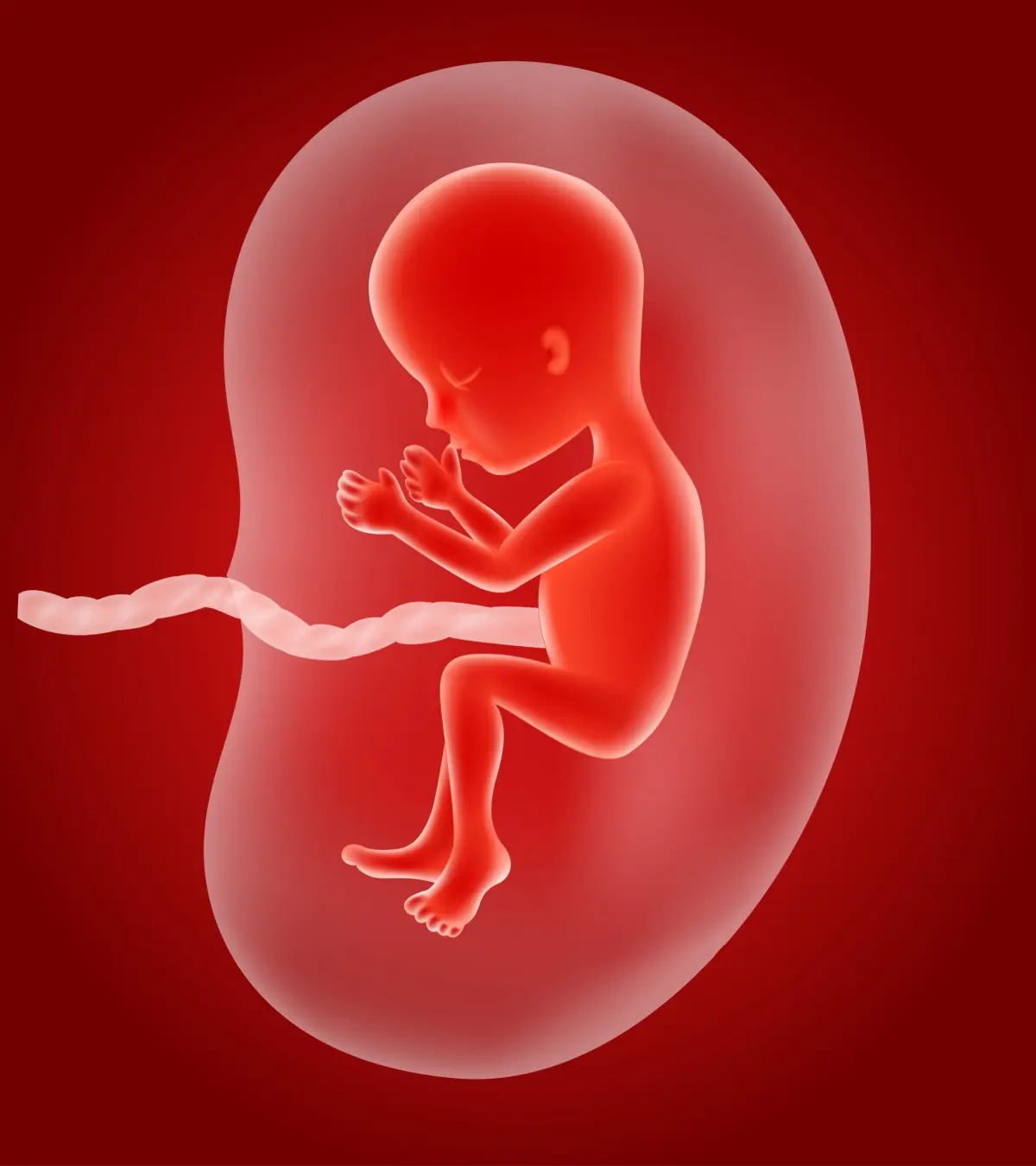
Image: Shutterstock
FSH is a hormone that plays a crucial role in both male and female sexual development and function, and its levels may be measured via a blood or urine test. While there is no significant role of FSH during pregnancy and it remains low throughout the pregnancy, your doctor may suggest this test during prenatal visits to rule out specific disorders (1). Understanding the significance of FSH may help detect possible disorders. Read this post to know more about FSH, its importance during pregnancy, and how the test is done.
Key Pointers
- FSH is a pituitary hormone that helps produce sperm, causes eggs to mature, regulates the menstrual cycle, and forms the placenta during pregnancy.
- Low levels of FSH caused by anorexia nervosa, hypothalamic disorders, and pituitary gland-related disorders can lead to hypopituitarism and Turner syndrome in pregnant women.
- The expected optimum level of FSH during the first trimester of pregnancy is below 2mlU/ml and progressively between 3 and 10mlU/ml.
- One need not fast when preparing for an FSH test, but should stop taking some medications. Consultation with a doctor is recommended.
- The FSH test is considered safe for pregnant women and the fetus, but any discomfort experienced during the test, such as dizziness, should be reported to the healthcare provider.
What Is The Meaning Of FSH?
FSH is the shorter term used to refer to the follicle stimulating hormone. It is one of the many hormones that are secreted by the pituitary glandiA tiny, pea-sized gland that is critical for controlling all other glands in the body . FSH stimulates your ovaries, helps to produce mature eggs and also helps in ovulation. It also helps to regularize your menstrual cycle. Furthermore, it also signals the ovaries to produce estrogeniA sex hormone responsible for the development of female sexual characteristics (2). In men, it helps to produce sperm. The FSH, along with the luteinizing hormoneiA hormone responsible for the body’s functioning and stability by regulating hormones and controlling the nervous system , helps to take care of many important functions in your body.
What Should Be FSH Levels During Pregnancy?
Ideal FSH in pregnancy are extremely crucial while you are pregnant. Current research does not provide a clear standard for FSH levels throughout pregnancy. Some reports suggest that FSH levels may start around two mIU/mL in the early stages and fluctuate between three to 10 mIU/mL later on. However, these figures are not consistent, and more research is needed to determine accurate reference ranges. One study found that FSH levels dropped significantly in early pregnancy, decreasing from a median of 1.7 mIU/mL (with a peak value of 18.3 mIU/mL) within six to 10 days after ovulation, to as low as 0.1 mIU/mL between 26 to 30 days after ovulation. This suggests that FSH remains very low during the early phase of pregnancy (3). FSH levels may show a mild increase around mid-pregnancy, which is thought to support the early development of the fetus’s reproductive system such as ovarian follicles in females and seminiferous tubules in males (1).
What Conditions Can Lower The FSH Levels?

There are various conditions that may lower your FSH levels:
- A condition known as anorexia nervosaiAn eating disorder characterized by severe food restriction and an intense fear of putting on weight can lower your FSH levels extensively (4).
- Any disorder in the hypothalamusiAn area in the brain that is responsible for hormone production and stimulating body processes. can cause a dip in your FSH levels.
- Any disorder in the pituitary gland can also make your FSH levels go extremely low (5).
 Quick fact
Quick factWhat Do Low FSH Levels Indicate?

Your FSH levels during pregnancy will generally be too low to be measured properly. This might look like the levels are very low. A low count of FSH could indicate the following conditions (1):
- A condition known as hypopituitarism, where your pituitary gland does not produce the hormones it is supposed to produce. In some cases, it may produce them in very low quantities.
- Very poor FSH levels can also indicate a condition known as Turner syndrome. It is a chromosome-related condition that affects the development and growth of females (6).
 Quick fact
Quick factHow Do You Prepare For The FSH Test?
FSH levels are measured through a blood test. There are a few steps that have to be followed before going for the FSH test. While you are pregnant, there may be certain variations keeping your condition and health in mind. Speak to your doctor first to know how you should prepare before going for the test. Here are the steps that are generally followed in preparation:
You will not have to stop any fluid or food intake. You can eat your normal diet.
Your doctor may ask you to stop taking any medications 48 hours prior to the test. Speak to your doctor about your pregnancy and mention the medications you are currently taking. Your doctor may ask you to stop all or a few of them. In some cases, your doctor may allow you to continue with medication even when you are about to go for the test (2).
Are There Any Special Precautions To Be Taken After The Test?

There are no special precautions that you need to take. However, make sure you inform the healthcare provider about your pregnancy. In case you feel dizzy or uncomfortable during or after the test, ask for assistance and sit down where you are comfortable.
Can The Test For FSH During Pregnancy Cause Any Side Effects?

The FSH test is considered absolutely safe and does not have any known side effects. If you experience any discomfort or dizziness during pregnancy, whether during or after the test, be sure to inform your healthcare provider.
Frequently Asked Questions
1. What happens to LH and FSH levels during pregnancy?
Serum follicle-stimulating hormone (FSH) levels can remain low and return to normal levels in the follicular phase around 20 days after delivery. During the early weeks of pregnancy, the FSH levels can be around 0.1international units (IU). Luteinizing hormone (LH) surge is not seen in pregnancy, and it may remain at low levels in pregnancy (7).
2. Does high FSH cause miscarriage?
Elevated FSH levels are associated with unexplained recurrent pregnancy loss (RPL) or miscarriage in some women. This can be due to diminished ovarian reserveiThe estimated reproductive capacity of a woman’s ovaries based on the quality and the quantity of eggs (2).
3. Is it possible to conceive with high FSH?
Studies have shown that the conception rate was low or nonexistent, with an FSH value greater than 15. Some pregnancies occur in women with FSH levels between 10 and 15 IU. Many IVF clinics accept FSH values less than 10 for their selected candidates (9).
4. What is a good FSH level for fertility?
FSH values can be between 4.7 to 21.2 in women still menstruating. The indicated values may vary based on the test and other factors (5).
5. How do lifestyle factors affect FSH levels during pregnancy?
During pregnancy, maintaining a healthy lifestyle is important. Eating a nutritious diet, staying physically active, managing stress, and avoiding tobacco and excessive alcohol may support overall well-being. While these changes alone may not drastically influence FSH levels, they contribute to better health.
Follicle stimulating hormone or FSH during pregnancy usually remains low. In women, the hormone stimulates the release of eggs from the ovaries. Disorders of the pituitary gland or hypothalamus may reduce FSH secretion. Additionally, Turner syndrome may cause low FSH levels. An FSH test may be suggested during pregnancy to screen for certain disorders. Some medications may alter the results of an FSH test, so you may inform your doctor beforehand about the medicines you are using before taking the test.
Infographic: Conditions Causing Abnormal FSH Levels
Follicle-stimulating hormone (FSH) is crucial for the reproductive system to function properly. In women, it assists in producing mature eggs. However, your doctor may suggest getting your FSH levels checked during pregnancy. The infographic below discusses the conditions that usually cause abnormal FSH levels in the body.

Illustration: Momjunction Design Team
Illustration: FSH Levels During Pregnancy

Image: Dall·E/MomJunction Design Team
Learn about the roles of the hormones FSH and AMH in your pregnancy, explained in detailed by a fertility specialist.
References
- Follicle-Stimulating Hormone (FSH).
https://my.clevelandclinic.org/health/articles/24638-follicle-stimulating-hormone-fsh - Follicle-Stimulating Hormone (FSH) Level Test.
https://medlineplus.gov/lab-tests/follicle-stimulating-hormone-fsh-levels-test/#:~:text=In%20women%2C%20FSH%20helps%20control,control%20the%20production%20of%20sperm. - Zinaman, Michael J., et al; HCG And FSH Levels During Early Pregnancy and Reproductive Aging [24A].br> https://journals.lww.com/greenjournal/abstract/2020/05001/hcg_and_fsh_levels_during_early_pregnancy_and.46.aspx
- Anorexia Nervosa – Medical Complications.
https://jeatdisord.biomedcentral.com/articles/10.1186/s40337-015-0040-8 - Follicle-stimulating hormone (FSH) blood test.
https://www.mountsinai.org/health-library/tests/follicle-stimulating-hormone-fsh-blood-test#:~:text=Low%20FSH%20levels%20in%20women,or%20all%20of%20its%20hormones - Orlowski, Michelle, and Manbeer S. Sarao; Physiology, Follicle Stimulating Hormone.
https://www.ncbi.nlm.nih.gov/books/NBK535442/ - M Hirano et al.; (1976); Dynamic changes of serum LH and FSH during pregnancy and puerperium.
https://pubmed.ncbi.nlm.nih.gov/772883/ - S W Trout and D B Seifer; (2000); Do women with unexplained recurrent pregnancy loss have higher day 3 serum FSH and estradiol values?.
https://pubmed.ncbi.nlm.nih.gov/10927054/ - Fertility FSH Levels Study.
https://www.ohsu.edu/womens-health/fertility - About Turner Syndrome.
https://www.turnersyndrome.org/ts-overview
Community Experiences
Join the conversation and become a part of our nurturing community! Share your stories, experiences, and insights to connect with fellow parents.
Read full bio of Dr. Annal Vaidya
Read full bio of shreeja pillai
Read full bio of Rebecca Malachi
Read full bio of Dr. Joyani Das

















